U.S. Judge O’Meara dismisses motion challenging constitutionality of JLWOP state statutes; motion for reconsideration still pending
Deadline of Aug. 24 looms for prosecutors’ motions on re-sentencing; they have re-recommended JLWOP for 80%; SADO cooperating as defense
No transparency: Wayne Co. Pros. Kym Worthy filed motions f0r either JLWOP or term of years for 147 prisoners; they are not in court records
Charles Lewis’ court record still missing, no motion to dismiss his case has been filed by SADO; Worthy has re-recommended JLWOP for him
Issues remain for other juvenile lifers
By Diane Bukowski
August 16, 2016
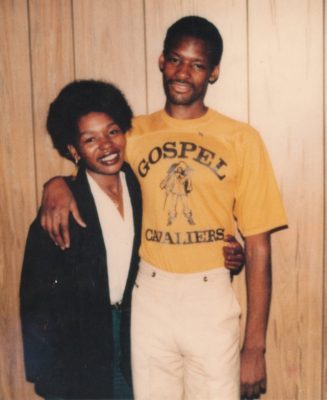
Rosie Lewis with her son Charles after his imprisonment in 1977.
DETROIT— “This amounts to genocide,” Rosie Lewis, mother of Michigan juvenile lifer Charles Lewis, who has been in prison for 41 years since the age of 17, said. “They keep our men locked up forever, so they cannot have children and grandchildren.”
She was returning with this reporter from a hearing July 28 in front of U.S. District Court Judge John Corbett O’Meara on the constitutionality of Michigan state statutes passed after the U.S. Supreme Court 2012 ruling in Miller v. Alabama. The USSC declared juvenile life without parole unconstitutional, a violation of the Eighth Amendment as “cruel and unusual punishment.
Judge O’Meara ruled in Hill v. Snyder in 2013 that ALL of the state’s juvenile lifers were parole eligible, citing Miller.
“. . .a lifetime in prison is a disproportionate sentence for all but the rarest of children, those who crimes reflect ‘irreparable corruption,” U.S. Supreme Court Justice Anthony Kennedy said in the subsequent Montomery v. Louisiana decision, handed down Jan. 25, 2016.
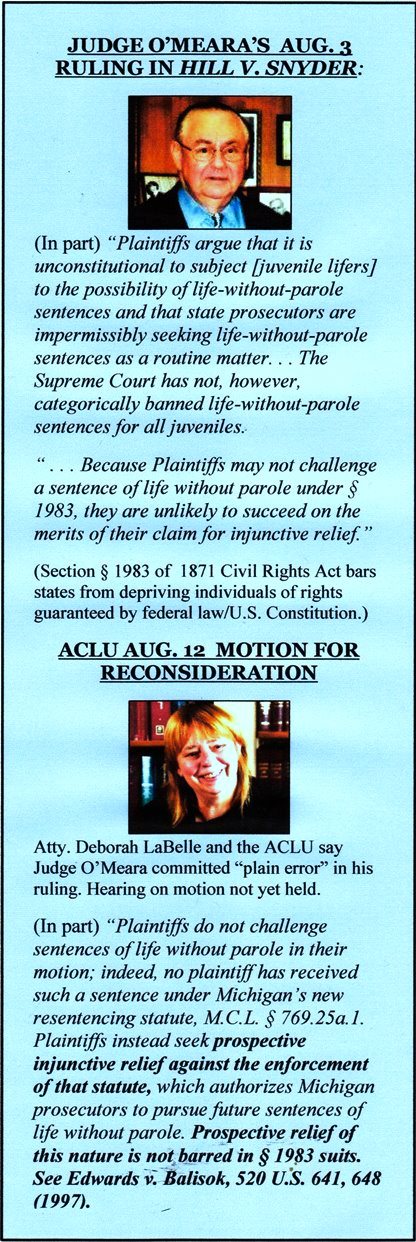 Despite Attorney Deborah LaBelle’s testimony July 28 that state prosecutors have re-recommended juvenile life without parole for 80 percent of Michigan’s juvenile lifers, on Aug. 3 Judge O’Meara handed down an unexpected ruling. He denied a motion for an injunction preventing further actions by courts until the constitutionality of the state statutes, MCL 769.25 and MCL 769.25a, can be determined. (See links to statutes at end of story.)
Despite Attorney Deborah LaBelle’s testimony July 28 that state prosecutors have re-recommended juvenile life without parole for 80 percent of Michigan’s juvenile lifers, on Aug. 3 Judge O’Meara handed down an unexpected ruling. He denied a motion for an injunction preventing further actions by courts until the constitutionality of the state statutes, MCL 769.25 and MCL 769.25a, can be determined. (See links to statutes at end of story.)
The motion was made by LaBelle, the American Civil Liberties Union, and Attorney Ron Reosti.
Judge O’Meara has not yet held a hearing on the plaintiffs’ motion for re-consideration filed Aug. 12. (See box at left for synopses and links to motions at end of story.)
But state prosecutors are moving full speed ahead to meet an Aug. 24 deadline for filing re-sentencing motions, in some cases without sufficient trial records and other information needed to have a legitimate Miller re-sentencing hearing.
The State Appellate Defender’s Office (SADO) was appointed by the state and county prosecution officials as defense counsel in these re-sentencings, for those without paid counsel. It is co-operating with the prosecution in going forward. It earlier refused to challenge the state statutes as the ACLU has done.
Several of Wayne County’s juvenile lifers have reported to VOD that they received letters indicating the prosecutor was recommending either life without parole AGAIN, or a term of years.
Worthy released a statement July 22 saying JLWOP was being sought for 63 Wayne County juvenile lifers, 40 percent of the total, with 81 receiving recommendations for a term of years. She along with most county prosecutors including Oakland County’s Jessica Cooper has long been a fervent advocate of juvenile life without parole, even testifying at state legislative hearings.
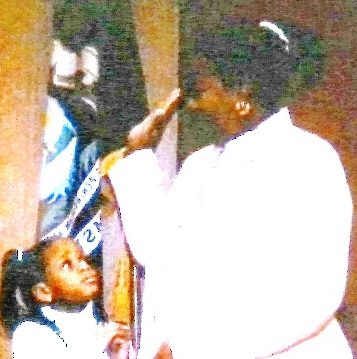
Wayne Co. Prosecutor Kym Worthy at swearing-in in 2004, with adopted daughter Anastasia. She has since adopted twins according to news reports, but appears to have no compassion for Black youth as a whole. Ninety-eight percent of Wayne County’s juvenile lifers are Black.
“Although we had a short amount of time under the statute, we gave a considered and thoughtful review. We combed trial transcripts, prison records, and numerous other documents,” she claimed.
But Charles Lewis, who has spent 41 years in prison for a crime that VOD research showed he did not commit, told VOD he received a letter saying Worthy is seeking JLWOP again for him, with no reasons cited.
Court personnel testified in post-conviction hearings this year in front of Wayne County Circuit Court Judge Qiana Lillard that Lewis’ entire court record, consisting of three cartons of files, has disappeared. His court register of actions shows only entries beginning in the year 2000. There is no official court file on those either, only a sketchy file of documents with no records of action related to the post-conviction hearings kept in Judge Lillard’s office, which the court reporter threw together after VOD’s request to view it.
Under previous Michigan Supreme and Appeals Court rulings, Lewis should have had his conviction vacated and been released pending a possible new trial. The previous rulings are People v Adkins, 436 Mich 878; 461 NW2d 366 (1990), in which the Michigan State Supreme Court vacated the conviction of the defendant because court reporter files containing his guilty plea were lost. He was released from prison. Earlier Courts of Appeals found similarly in People v Jones, and People v. Horton. (See links at end of story.)
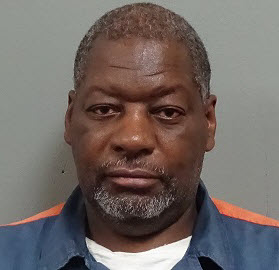
Charles Lewis at age 57.
“I think that my case is the test case for how missing transcripts and files will be dealt with in the future,” Lewis wrote to VOD. “I also think that if I can successfully challenge the juvenile statute that it will help other similarly-situated juveniles in the future. Right now I’m 57 years old and the best years of my life are behind me. So, I fight to make things better for those coming behind me. Hopefully, if I play my part they won’t have to go through what I’ve gone through.”
Attorney Valerie Newman of SADO is coordinating its defense for Lewis and other state juvenile lifers. Since SADO took over his case, no further hearings on locating his files or his demand for a dismissal of his conviction have been held. Neither Newman, SADO Deputy Director Michael Mittlestat, SADO Director Dawn Van Hoek, nor State Rep. Rosemary Robinson have yet responded to emails from VOD requesting to know why a motion to vacate Lewis’ conviction has not been filed under SADO’s legal obligation to their client.
(For full email, see: http://voiceofdetroit.net/wp-content/uploads/Media-inquiry-to-Valerie-Newman-et-al-re-Charles-Lewis-1.pdf)

Atty. Valerie Newman at Feb. prayer breakfast for Davontae Sanford, charged at the age of 14 for four drug-related murders in 2007. Newman has received most credit in the mainstream media for Sanford’s release. However, innocence clinic Attys. David Moran and Megan Crane filed the 2015 motion asking for his exoneration, spending extensive time on the matter. Instead, Newman and an atty. from Dykema Gossett negotiated a settlement for “dismissal without prejudice” of the charges, meaning they can be brought back. Sanford is NOT exonerated.
Newman told VOD, “The State Appellate Defender Office will vigorously represent all clients in post-Montgomery matters, when appointed by courts to do so. SADO is Michigan’s only statewide, state-funded, public defender office. Like the Attorney General, SADO has received some state funding to support litigation in the juvenile lifer cases. Because prosecutors are seeking life without parole sentences in a large number of cases, and many contested hearings will result, SADO will seek additional funding to support its duty to provide constitutionally adequate representation to its clients.”
Worthy amended her July 22 press release in response to VOD’s questions on the Lewis case.
“In the cases where we recommended life without parole many of the juveniles committed disturbing crimes, and once they were in prison they continued to commit crimes, and have had serious misconduct issues well into mature adulthood,” Worthy said without specifics.
“These are facts that simply cannot be ignored. However, I think that before the re-sentencing hearings begin, that we will receive more records and documents related to the some of the 60 offenders that we will continue to review, because this may cause a different recommendation in some cases. All of our reasoning in these cases will be revealed in court at the re-sentencing hearings.”
Although Worthy said motions had been filed in court July 22, there are none listed in individual files, contrary to law making all such court records available to the public. VOD has left a message for Chief Judge Pro-Tem Timothy Kenny requesting copies of these records.
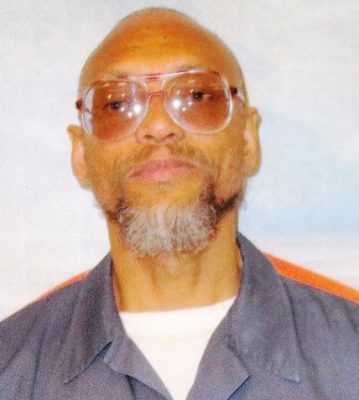
Edward Sanders
Other juvenile lifers have told VOD they too were notified of prospective prosecutor motions in their cases, but raised some issues.
“The prosecutor agreed to have me resentenced to a term of years,” Edward Sanders, who has served 41 years for a 1975 drive-by killing in which he was not the shooter, wrote. “As you noted, they may very well seek a 40-60 years sentence. I will request 25-40 because the MDOC may very well not give us our good-time which would reduce any sentence to time served. The ACLU is seeking to make this happen as well. I am looking for work as a paralegal. If I have a job offer before I get back to court it may very well give me the low end of the sentence!”
The state statutes bar consideration of good time for juvenile lifers, although it is allowed for every other category of prisoner.
Sanders, incarcerated at Chippewa Correctional Facility, wrote regarding another prisoner there.
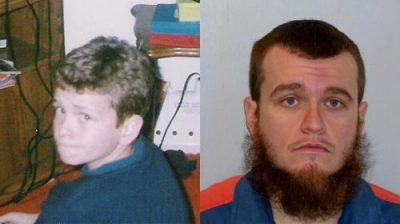
Matthew Bentley at 14, when he was charged, and today.
“This is to inform you about Matthew Scott Bentley. His attorney Douglas R. Mulkoff wrote him and said [he] spoke to Huron County Prosecuting Attorney Timothy Rutkowski. He informed me that they have filed a notice of their intention to go forward seeking the LWOP sentence against [him]. The case will go before Richard Knoblock’s successor Judge Prill. . . .[Mulkoff] asked him if any family members were taking a hard line and he said yes, the daughter who lives in Pennsylvania is taking a hard line wanting you to not get a term of years sentence. He asked that Mr. Bentley not lose hope and that his office will not give up.”
Bentley was 14 when he broke into a home, stole a gun, and shot the homeowner. He told the Guardian that he regretted his action at that very second. Nothing is said in Miller about consultation with the families of victims, but such language was included in Michigan’s statutes.
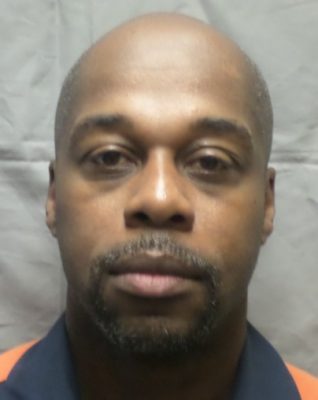
Henry Hill, Jr.

Keith Maxey
Bentley is one of the original plaintiffs in the ACLU’s Hill v. Snyder case. Henry Hill was originally the first plaintiff. LaBelle has said that he too is facing a prosecutor recommendation of life without parole. Another plaintiff, Keith Maxey, is facing the same recommendation. Maxey is only 25 and recently was denied surgery for life-threatening problems by the Michigan Department of Corrections. Both Hill and Maxey are from Detroit, in Wayne County, where Prosecutor Kym Worthy’s office made the recommendations.
It is not known what recommendation Worthy made for Cortez Davis, one of three key juvenile lifers whose cases reached the Michigan Supreme Court under Miller. The MSC ruled against them, saying Miller was not retroactive.
Their cases, along with that of Charles Lewis and several others, made it on appeal to the U.S. Supreme Court, which remanded them back to the Michigan State Supreme Court after the Montgomery ruling on retroactivity. The MSC remanded the cases to the trial judges or replacements, but stating they are to be re-sentenced under the challenged state statutes.
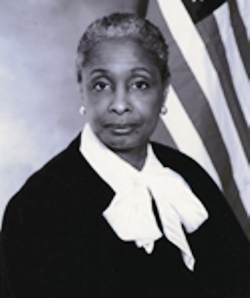
Judge Vera Massey-Jones

Cortez Davis
But Cortez Davis’ case is unique. His sentencing Judge Vera Massey-Jones ruled in 1994 that juvenile life without parole was unconstitutional, and refused to sentence Davis to that term.
Michigan Appeals Courts overturned that sentence and Massey-Jones’ subsequent rulings after Miller was handed down. In the order below, Judge Massey-Jones again scheduled a re-sentencing hearing for Davis in 2012, but Wayne County Prosecutor Kym Worthy appealed her order and got it overturned. Judge Massey-Jones was set to retire in 2015. It is not currently known if she will return to hear Davis’ re-sentencing or whether another judge will be assigned.
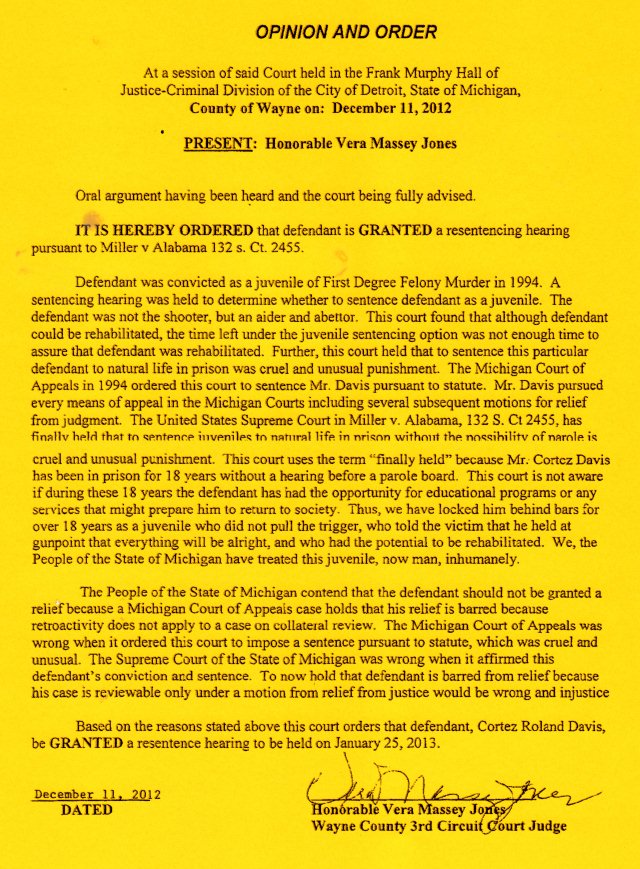 Davis recently contacted VOD.
Davis recently contacted VOD.
“I would like for you to show that the rehabilitation process works and show that it has worked in me,” he said. “Like I told you before, in 1994 I was sentenced to 10 to 40 years and that sentence was taken from me by the Michigan Court of Appeals [citing] the statute that my sentencing judge (Hon. Vera Massey Jones) declared unconstitutional according to the Eighth Amendment at that time. Eighteen years later, in 2012 the United States Supreme Court declared that the same statute that Judge Jones found to be unconstitutional was in fact unconstitutional, therefore, requiring my original sentence to be re-instated.
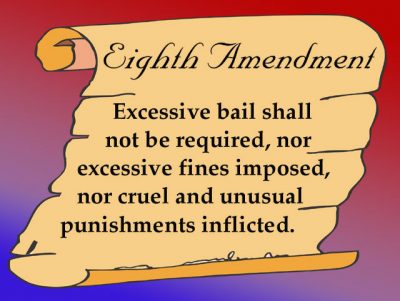 “In addition to not being the shooter, I am very sorry for the life that was taken and I accept responsibility for my actions, but the current law does not take into consideration that some juveniles were just aiders in a robbery or drug deal, but never had any intentions on anyone getting hurt. Like myself, I never thought that far ahead. I was homeless and just wanted a place to get out of the cold for awhile and I agreed to do something that had never crossed my mind before. However, violence was never something that I just went out and did.”
“In addition to not being the shooter, I am very sorry for the life that was taken and I accept responsibility for my actions, but the current law does not take into consideration that some juveniles were just aiders in a robbery or drug deal, but never had any intentions on anyone getting hurt. Like myself, I never thought that far ahead. I was homeless and just wanted a place to get out of the cold for awhile and I agreed to do something that had never crossed my mind before. However, violence was never something that I just went out and did.”
He added, “The MDOC does not offer lifers anything beyond a GED where education is concerned due to making those with close release dates a priority. If you take a look at my accomplishment as it relates to education, you’ll find that my determination fostered by my recognition for change in myself led me to succeed more than the average prisoner that did not have life. In other words, not knowing if I would ever get out of prison did not stop me from changing my life for the better. I still saw reasons to change and become a better person and now I hope to show society that I am able to live among them and be an asset and not a burden. I want to help with crime prevention. I know that I can reach young people. I do it now with the GOALS program here talking to at risk youths.”
“I ask just for a chance,” he concluded. “My trial judge saw something in me that I did not, but I dedicated my life to making her vision a reality and it is now my vision. I see myself the way I need to be seen and that is as a productive citizen.
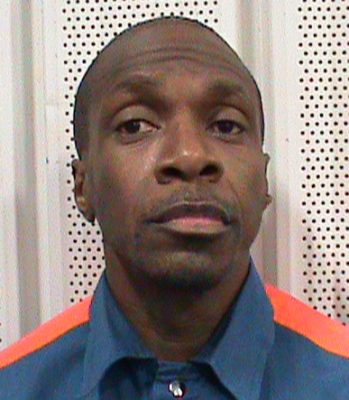
Timothy Kincaid
Juvenile lifer Timothy Kincaid, now 54, was 16 when he was charged as an accomplice to an older man in three 1976 murders. VOD attended a hearing June 27 on a post-Montgomery motion for relief from judgment in his case.
“I didn’t think there was any reason for doubt after the Miller v. Alabama ruling, ” Wayne County Circuit Court Judge James Callahan said. “I’ve had a jury treading water since August of last year on another [juvenile lifer] case.”
It was not decided whether judges or juries would handle juvenile re-sentencing cases until a joint Court of Appeals panel ruled July 21 in the case of Kenya Ali Hyatt that judges would be responsible.
Kincaid’s attorney, Gerald Evelyn, said he was “guardedly optimistic” that Callahan would give Kincaid the minimum sentence of 25 years and that he would be immediately paroled. He said a woman who was injured during the multiple murders and is in a wheelchair plans to come to court to ask for Kincaid’s release.
Kincaid’s friend, now Minister Ervin Bell, attended the June 17 hearing.

Minister Ervin Bell (Facebook photo)
“I’ve known him since childhood,” Min. Bell said. “Me and little Tim hung out together just about every day. But I clearly remember the day that [an older man] pulled up on us in his ’77 Fleetwood. Tim was blinded by the flash. Whatever part he played in the murders, he was forced to play. He was not the type to try to hurt anybody.”
Another post-conviction hearing was held Aug. 5, with Kincaid present. A hearing is set for Sept. 29 at 9 a.m. in front of Judge Callahan, likely for Kincaid’s Miller re-sentencing.
As in Kincaid’s case, juvenile lifer Damion Todd was forgiven by the mother of a young woman killed during a shoot-out between two groups of teens. She was on Todd’s visiting list for years until he was moved and her health declined. He said she told him, “I forgive you Damion, and I want you to promise me that when you come that you won’t let me and your family down.”
“I am constantly in a state of anxiety as I eagerly await future Miller/Montgomery re-sentencing hearings, and/or a Hill parole board hearing. I am prepared, as I have just finished completing another class . . . sponsored by the American Friends Service Committee and the National Lifers of America geared toward either one of these proceedings. Currently I am helping a few other men to facilitate a class for our group of juvenile lifers.”

Damion Todd (r) with brother and mother
He said earlier, “From a personal standpoint, while never glorifying this tragic ordeal, I yearn for the opportunity to educate not only at-risk youth, all youth. The consequences of one bad choice will not only change the course of your life, but it will also administer so much psychological harm and pain on the lives of people that you don’t even know. As a man, I refuse to allow anyone’s life that has been tragically lost go in vain, and don’t at least try to open the eyes and ears of some at-risk youth.”
One key sentence in his letter summed up the plight of juvenile lifers in Michigan, which has the second highest number in the country, as well as 2,270 across the U.S.
“Although one of my immediate personal goals is to be the best person I can be under these circumstances, I am constantly and diligently working towards becoming a productive FREE MAN in society which is something I’ve never experienced before BECAUSE I CAME TO PRISON AS A CHILD.”

Related documents:
http://voiceofdetroit.net/wp-content/uploads/Hill-v-Snyder-injuntion-denied-8-3-16.pdf
http://voiceofdetroit.net/wp-content/uploads/Hill-v-Snyder-reconsider.pdf
http://voiceofdetroit.net/wp-content/uploads/Kenya-Hyatt-COA-ruling-July-21-2016.pdf
http://voiceofdetroit.net/wp-content/uploads/Juvenile-lifers-mcl-769-25a-3.pdf
Related articles:
http://fairsentencingofyouth.org/2016/06/16/colorado-eliminates-life-without-parole/
http://fairsentencingofyouth.org/2016/06/07/philadelphia-da-will-no-longer-seek-jlwop/
http://www.detroitnews.com/story/opinion/2016/06/02/prisoner-re-entry-detroit-comeback/85268614/
http://voiceofdetroit.net/2013/02/12/juvenile-lifer-reflects-on-hill-ruling-by-judge-omeara/
http://voiceofdetroit.net/2012/10/28/michigans-juvenile-lifers/
http://voiceofdetroit.net/2011/03/06/voice-of-juvenile-defendants/
#FreeMichiganJuvenileLifersNOW, #SaveOurChildren, #PrisonNation, #ENDMassIncarceration, #SchooltoPrisonPipeline, #Breakdownthewalls, #Beatbackthebullies, #Blacklivesmatter, #BlacklivesmatterDetroit, #Blackkidslivesmatter, #StandUpNow, #StopWaronBlackAmerica, #StopWaronourYouth, #Michissippigoddam





Kym Worthy has got to be stopped. Detroiters must vote en masse to remove her, or voters in the outlying areas of Wayne County will keep her and her draconian policies in office. Is it that she hates all Blacks or just herself?
Kym Worthy has got to be stopped. Detroiters must vote en masse to remove her, or voters in the outlying areas of Wayne County will keep her and her draconian policies in office. Is it that she hates all Blacks or just herself?